四级听力讲义
- 格式:doc
- 大小:219.50 KB
- 文档页数:43
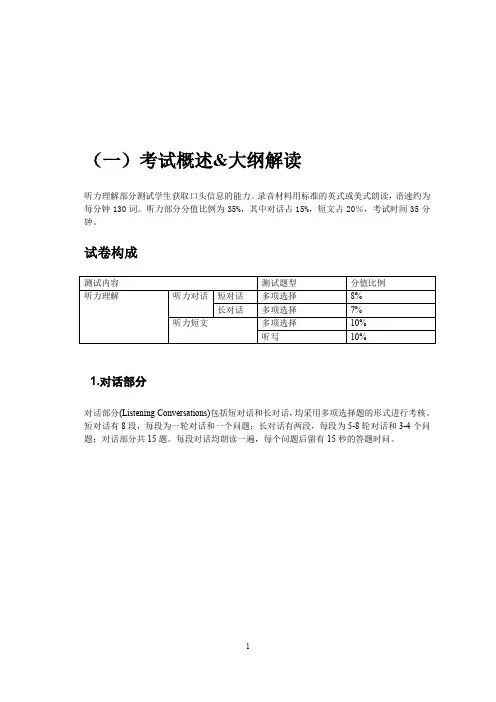
(一)考试概述&大纲解读听力理解部分测试学生获取口头信息的能力。
录音材料用标准的英式或美式朗读,语速约为每分钟130词。
听力部分分值比例为35%,其中对话占15%,短文占20%,考试时间35分钟。
试卷构成1.对话部分对话部分(Listening Conversations)包括短对话和长对话,均采用多项选择题的形式进行考核。
短对话有8段,每段为一轮对话和一个问题;长对话有两段,每段为5-8轮对话和3-4个问题;对话部分共15题。
每段对话均朗读一遍,每个问题后留有15秒的答题时问。
2.短文部分短文部分包括多项选择题型的短文理解(Listening Passages)和复合式听写(Dictation)。
多项选择题型的短文有3篇,每篇长度为210-250词,朗读一遍,每篇3-4题,共10题,每个问题后留有15秒的答题时间。
复合式听写测试考生在不同层面上(从词汇到语篇)的听力理解能力。
这部分测试采用一篇200-250词的短文,删去若干个单词和短语,全文朗读三遍。
要求考生根据听到的内容填写所缺信息,所缺单词和短语必须用原词填写。
听力理解考核的语言技能要求A理解中心思想和重要细节1)理解中心思想2)听懂重要的或特定的细节3)判断说话人的观点、态度等B理解隐含的意思4)推论隐含的意义5)判断话语的交际功能C借助语言特征理解听力材料6)辨别语音特征,如从连续的话语中辨别语音、理解重音和语音语调等7)理解句间关系,如比较、原因、结果、程度、目的等(二)基础能力篇1.基础词汇2.单词理解背诵的过程3.易混发音的分辨4.英式发音与美式发音的区别5.连读与缩读弱读6.重音与实意重读7.听力场景词汇1. 基础词汇大学英语4级考试要求考试掌握大约4600词,但听力部分的实际考查词汇量要低于4000,其考查重点是测试考生获取口头信息的能力。
2. 单词理解背诵的过程1)I love you!2)我爱你!3)一会下课以后我请你去吃麦当劳怎么样?4)what @#%#??#%$%&^#%*&*# lecture?....音义形解决方案:1)建立自己的听力生词库2)变拼写形象记忆为声音形象记忆3)进行听写和跟读训练3. 易混发音的分辨1)[e][æ][ai]said sad sideletter ladder lighterfriend bad tigervery vary2)[w][v]west vestwet vet3)[l][əu]goal gocold coat4) [h]高语速中字母h出现在单词词首且非重读时往往会被“击穿”掉,即字母[h]不发音的情况5)[u:][u]food footfool fullpool pullluke look6) [ l ] [n]light nightlet net4. 英式发音&美式发音大学英语四级考试采取的英式发音与美式发音结合的所谓“国际发音”方式。
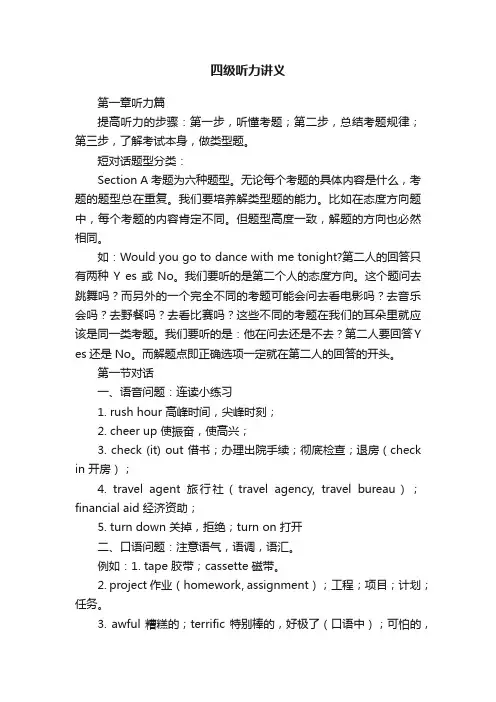
四级听力讲义第一章听力篇提高听力的步骤:第一步,听懂考题;第二步,总结考题规律;第三步,了解考试本身,做类型题。
短对话题型分类:Section A考题为六种题型。
无论每个考题的具体内容是什么,考题的题型总在重复。
我们要培养解类型题的能力。
比如在态度方向题中,每个考题的内容肯定不同。
但题型高度一致,解题的方向也必然相同。
如:Would you go to dance with me tonight?第二人的回答只有两种Y es或No。
我们要听的是第二个人的态度方向。
这个题问去跳舞吗?而另外的一个完全不同的考题可能会问去看电影吗?去音乐会吗?去野餐吗?去看比赛吗?这些不同的考题在我们的耳朵里就应该是同一类考题。
我们要听的是:他在问去还是不去?第二人要回答Y es还是No。
而解题点即正确选项一定就在第二人的回答的开头。
第一节对话一、语音问题:连读小练习1. rush hour 高峰时间,尖峰时刻;2. cheer up 使振奋,使高兴;3. check (it) out 借书;办理出院手续;彻底检查;退房(check in 开房);4. travel agent 旅行社(travel agency, travel bureau);financial aid 经济资助;5. turn down 关掉,拒绝;turn on 打开二、口语问题:注意语气,语调,语汇。
例如:1. tape 胶带;cassette 磁带。
2. project 作业(homework, assignment);工程;项目;计划;任务。
3. awful 糟糕的;terrific 特别棒的,好极了(口语中);可怕的,恐怖的(阅读中)。
4. I can tell that. 我能看得出。
5. I understand that... 我听说……。
6. I have got this one. have= have got have to= have got to (gotta)7. must 在口语中表猜测8. I'll take this one. 我要买这个。
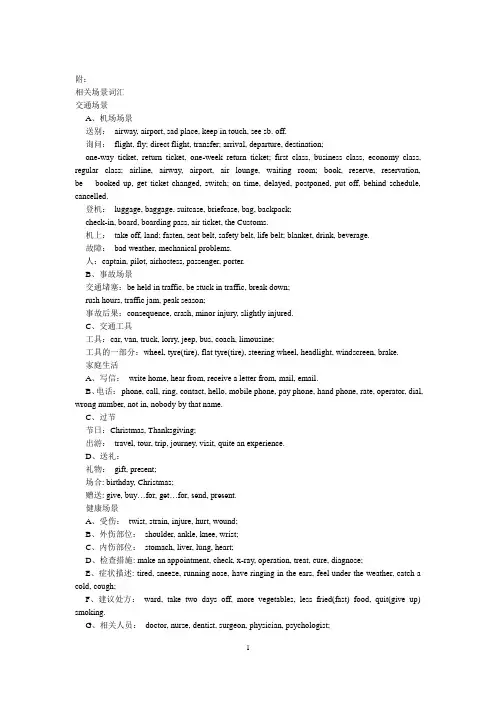
附:相关场景词汇交通场景A、机场场景送别:airway, airport, sad place, keep in touch, see sb. off.询问:flight, fly; direct flight, transfer; arrival, departure, destination;one-way ticket, return ticket, one-week return ticket; first class, business class, economy class, regular class; airline, airway, airport, air lounge, waiting room; book, reserve, reservation, be booked up, get ticket changed, switch; on time, delayed, postponed, put off, behind schedule, cancelled.登机:luggage, baggage, suitcase, briefcase, bag, backpack;check-in, board, boarding pass, air ticket, the Customs.机上:take off, land; fasten, seat belt, safety belt, life belt; blanket, drink, beverage.故障:bad weather, mechanical problems.人:captain, pilot, airhostess, passenger, porter.B、事故场景交通堵塞:be held in traffic, be stuck in traffic, break down;rush hours, traffic jam, peak season;事故后果:consequence, crash, minor injury, slightly injured.C、交通工具工具:car, van, truck, lorry, jeep, bus, coach, limousine;工具的一部分:wheel, tyre(tire), flat tyre(tire), steering wheel, headlight, windscreen, brake.家庭生活A、写信:write home, hear from, receive a letter from, mail, email.B、电话:phone, call, ring, contact, hello, mobile phone, pay phone, hand phone, rate, operator, dial, wrong number, not in, nobody by that name.C、过节节日:Christmas, Thanksgiving;出游:travel, tour, trip, journey, visit, quite an experience.D、送礼:礼物:gift, present;场合: birthday, Christmas;赠送: give, buy…for, get…for, send, present.健康场景A、受伤:twist, strain, injure, hurt, wound;B、外伤部位:shoulder, ankle, knee, wrist;C、内伤部位:stomach, liver, lung, heart;D、检查措施: make an appointment, check, x-ray, operation, treat, cure, diagnose;E、症状描述: tired, sneeze, running nose, have ringing in the ears, feel under the weather, catch a cold, cough;F、建议处方:ward, take two days off, more vegetables, less fried(fast) food, quit(give up) smoking.G、相关人员:doctor, nurse, dentist, surgeon, physician, psychologist;H、医疗相关:radio doctor, car doctor, repairman, mechanic, engineer;I、诊断行为:fix, mend, repair, stop working, go wrong.娱乐场景A、陶冶情操票务:ticket, fare;观赏活动:film, movie, theatre, concert, play, show, TV,art gallery;相关词汇:channel, part, actor, actress, scene, act, oil painting, romance, love story, horror, action, documentary, commentary, science, news, sports, comedy, soap opera, quiz show, sit-com(situation comedy), thriller;参与活动:dance, disco, sing, karaoke.B、户外活动出游:camping, picnicking, boating, skating, swimming, visiting, historical sites, natural beauty, scenery, tourist attraction, sightseeing;球赛:game, match, score, season, superstar.用餐场景:A、预定:a table for four, reserve a table, reservation, book, corner table;B、等待: hungry, starving, order, menu, waiting line, queue;C、用餐:try something Italian, appetite, appetizer, salad, soup, main dish, side dish, dessert;D、食物:steak, French fries, pizza, apple pie, spaghetti, sea food;E、埋单:treat, my turn, on me, go Dutch;学习场景A、选课: course, day course, evening course, optional course, literature, curriculum, extra curriculum;B、作业:report, essay, assignment, presentation, paper, due, credit, rewrite;C、考试:mark, score, exam, fail, pass, go over, review;D、教授:lecture, topic, briefing, mission, take notes, follow;E、学生:freshman, sophomore, junior, senior, graduation, graduate, undergraduate.买卖场景A、买卖租赁:for sale, rent, let, book, reserve, reservation;B、廉价购买:on sale, bargain, Sunday market, flea market, garage sale;C、买书:book, paperback, hardcover, edition, bestseller, copy, volume, magazine, issue, periodic;D、买家具:furniture, furnish;E、其他:straw hat, TV set, model;F、广告:advertise, advertisement, quote rate;工作场景A、找工作申请:apply, application letter, resume, CV, personal statement;寻觅:job-hunting, job opportunity, job vacancy, recruit;面试:interview, interviewer, interviewee;跳槽:job hopping.B、办公室工作:forward email, typing, type writer, typist, typing errors, Xerox copy, arrange appointment(files), confirm arrangement;出差:business trip, on behalf of, vacation;雇佣关系:employment, employee, employment, director, boss, secretary, be with + 单位/领导(be with the local newspaper).公共生活A、银行:account, loan, interest, interest rate, cash, cheque, deposit, draw, overdraft, exchange;B、填表:surname, last name, family name, first name, given name, sex, gender, address, occupation, marital status, print, sign, signature;C、邮局:deliver, send, mail, parcel, postage, registered mail, express mail, priority mail;D、租房:book, reserve, reservation, let, full up, booked up,single room, double room, three-bedroom house, bedroom, bathroom, waiting room, living room, sitting room, kitchen, dining room, balcony;E、交通标示:sign, one-way street, drunk driving, traffic rules, regulation, observe.天气场景A、天气:sunny, cloudy, overcast, snow, rain, drizzle, shower, downpour, rain cats and dogs, windy, breeze, gust, typhoon, tornado, twister, hurricane, storm, tsunami, cold, warm up, swing, dip, forecast.B、活动:BBQ(barbecue), laundry, camping.其他A、集会活动:appointment, date, meeting, conference, party, assembly, lecture, seminar;B、图书馆:library, librarian, overdue, fine;C、购物场所:department store, supermarket, gas station, convenience store, chain store, grocer’s, grocery.其他closed 关门open 开门office hours / business hours / working hours 工作时间,营业时间power on / off 开/关turn on / off 开/关switch on / off 开/ 关(这个词只能用于与电有关的开关,不能用于水龙头之类的开关the best book 最好的书the best thing 最好的事情the last thing 最不愿意做的事情the last man 最不愿意见的人best seller 畅销sell up 卖完,卖光售罄sell out卖完,卖光售罄/ 出卖朋友或原则sell off 低价处理库存商品selling machine 自动售货机selling point 卖点count the days 渴望count on = dependent / rely oncount in 把……考虑在内count for nothing 一钱不值count for little 无足轻重count for much 举足轻重count down 倒计时count up 相加count up to 共计关于旅行Traveljourney 陆上长途旅行trip 陆上短途旅行outing 远足stroll 散步wander 徘徊picnic 野餐camping 野营tour 周游cruise 水上短途旅行voyage 水上长途旅行关于死亡的说法没有感情色彩的:die / end up / meat one’s death / decease褒义的:pass away贬义的:kick the bucket关于"相处"的好的说法get on with = get along (well) with be in good term withlive in peace with关于强调point outemphasizelay / put emphasis ongive emphasis to达成协议找到出路find a way outreach an agreementreach a consensus关于“得失”gains and lossesgive and take关于拜访drop in / at / over / bystop in / over / bycall on sbcall at / round swlook in / uppay a visit topay / make a call to关于碰见,偶遇come acrossrun intobump intohappen to meet关于花钱、花费的词TakeSpendCostChargePayBuy关于水Waterrunning / tap ~ 自来水fresh ~ 活水still ~ 死水pure ~ 纯净水purified ~ 净化水mineral ~ 矿泉水be used to do 被用于be used to dong 习惯于get used to doing 渐渐习惯于used to do 过去常常单复数意思不太一样的词ruin 毁灭ruins 废墟authority 权威authorities 当局brain 头脑brains 智力,智慧custom 风俗习惯customs 海关damage 破坏,损坏damages 赔偿费ground 地面土地grounds 院子,监狱manner 礼貌方式manners 外貌minute 分钟minutes 会议记录paper 纸张papers 试卷time 时间times 时代关于“调查”Researchsurvey 市场调查opinion poll 名义调查questionnaire 问卷调查investigation 很正式的调查interview 会见,访谈belong to 属于participate in 参加be engaged in 从事、参加be involved in 卷入消磨时间kill timepass timecount one’s thumbs用完、缺少run out ofbe short ofbe lack ina little 一点not a little 很多a bit 一点not a bit 一点也没有。
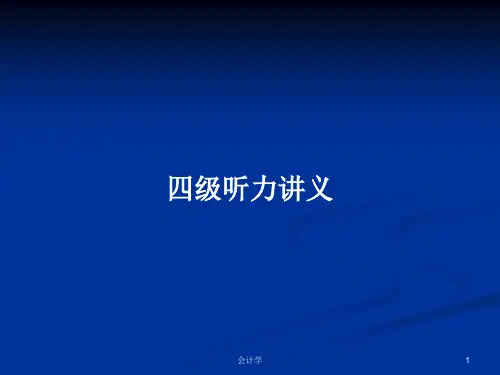
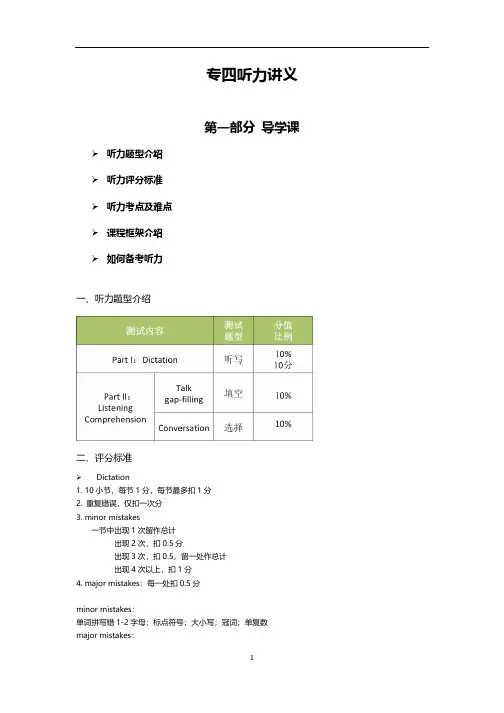
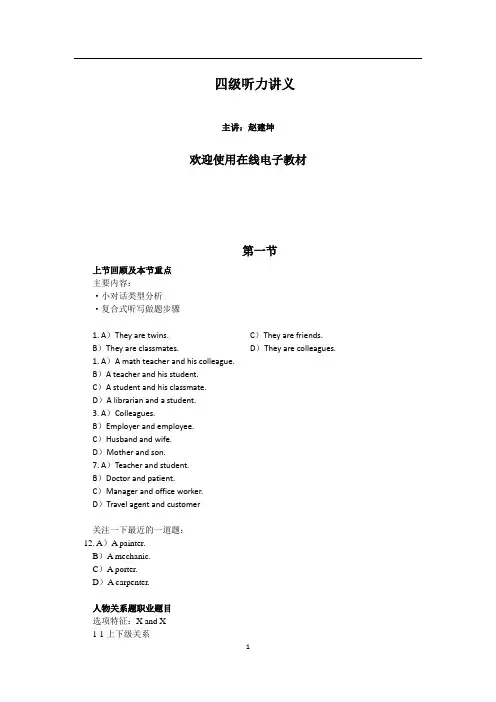
四级听力讲义主讲:赵建坤欢迎使用在线电子教材第一节上节回顾及本节重点主要内容:·小对话类型分析·复合式听写做题步骤1. A)They are twins. C)They are friends. B)They are classmates. D)They are colleagues.1. A)A math teacher and his colleague.B)A teacher and his student.C)A student and his classmate.D)A librarian and a student.3. A)Colleagues.B)Employer and employee.C)Husband and wife.D)Mother and son.7. A)Teacher and student.B)Doctor and patient.C)Manager and office worker.D)Travel agent and customer关注一下最近的一道题:12. A)A painter.B)A mechanic.C)A porter.D)A carpenter.人物关系题职业题目选项特征:X and X1-1上下级关系老板boss和秘书就是上下级关系,老板一般是由男士扮演的,秘书是由女士扮演的,请问同学秘书怎么写?secretary就是秘书。
判断方法:1.确认是不是办公室场景;2.一般都是下级先说话,老板后说话。
老板会确认或者是语气上的变化。
7.A)Teacher and student.B)Doctor and patient.C)Manager and office worker.D)Travel agent and customertravel agent被成为旅行社的代理人,旅行社工作人员,其中agent 特工,agency 代理处travel agency 旅行社W: Mr. Watson, I wonder whether it‘s possible for me to take a vacation early next month?M: Did you fill out a request form?Q: What is the probable relationship between the two speakers?a request form申请表fill out填写,在这里注意连音答案是C Manager and office worker.经理和职员,另外还有一个职员的写法staff,另外还有一个单词stuff 填充(动词),东西,物件(名词)。
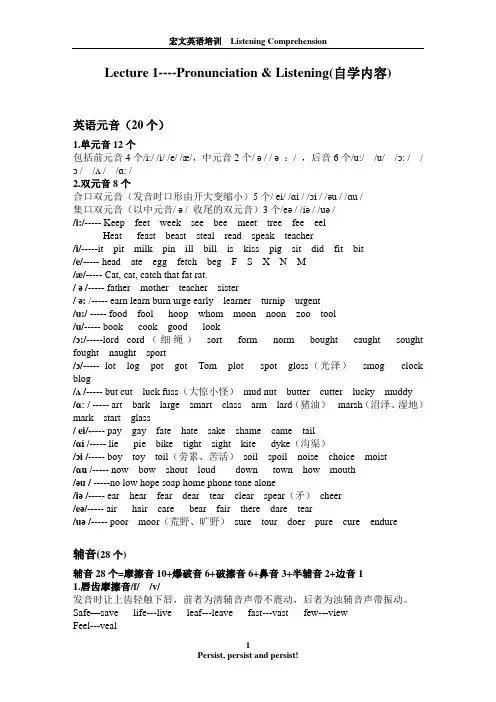
Lecture 1----Pronunciation & Listening(自学内容)英语元音(20个)1.单元音12个包括前元音4个/i:/ /i/ /e/ /æ/,中元音2个/ ə / / ə:/ ,后音6个/u:/ /u/ /ɔ: / / ɔ / /ʌ / /ɑ: /2.双元音8个合口双元音(发音时口形由开大变缩小)5个/ ei/ /ɑi / /ɔi / /əu / /ɑu /集口双元音(以中元音/ ə / 收尾的双元音)3个/eə / /iə / /uə //i:/-----Keep feet week see bee meet tree fee eelHeat feast beast steal read speak teacher/i/-----it pit milk pin ill bill is kiss pig sit did fit bit/e/----- head ate egg fetch beg F S X N M/æ/----- Cat, cat, catch that fat rat./ ə /----- father mother teacher sister/ ə: /----- earn learn burn urge early learner turnip urgent/u:/ ----- food fool hoop whom moon noon zoo tool/u/----- book cook good look/ɔ:/-----lord cord(细绳)sort form norm bought caught sought fought naught sport/ɔ/----- lot log pot got Tom plot spot gloss(光泽)smog clock blog/ʌ /----- but cut luck fuss(大惊小怪)mud nut butter cutter lucky muddy /ɑ: / ----- art bark large smart class arm lard(猪油)marsh(沼泽、湿地)mark start glass/ ei/----- pay gay fate hate sake shame came tail/ɑi /----- lie pie bike tight sight kite dyke(沟渠)/ɔi /----- boy toy toil(劳累、苦活)soil spoil noise choice moist/ɑu /----- now bow shout loud down town how mouth/əu / -----no low hope soap home phone tone alone/iə /----- ear hear fear dear tear clear spear(矛)cheer/eə/----- air hair care bear fair there dare tear/uə /----- poor moor(荒野、旷野)sure tour doer pure cure endure辅音(28个)辅音28个=摩擦音10+爆破音6+破擦音6+鼻音3+半辅音2+边音11.唇齿摩擦音/f/ /v/发音时让上齿轻触下唇,前者为清辅音声带不震动,后者为浊辅音声带振动。
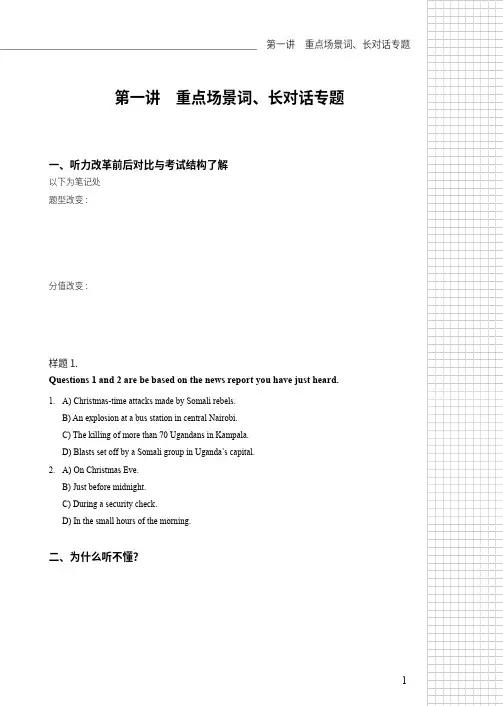
一、听力改革前后对比与考试结构了解以下为笔记处题型改变:分值改变:样题 1.Questions 1 and 2 are be based on the news report you have just heard.1. A) Christmas-time attacks made by Somali rebels.B) An explosion at a bus station in central Nairobi.C)The killing of more than 70 Ugandans in Kampala.D)Blasts set off by a Somali group in Uganda’s capital.2. A) On Christmas Eve.B)Just before midnight.C)During a security check.D)In the small hours of the morning.二、为什么听不懂?三、材料使用方式:四、场景词:校园场景:医院场景:机场场景:公司场景:宾馆场景:五、长对话热身练习 1 (2009 年 12 月) :Questions 19 to 22 are based on the conversation you have just heard.19. A) He prefers the smaller evening classes.B)He has signed up for a day course.C)He has to work during the day.D)He finds the evening course cheaper.20. A) Learn a computer language.B)Learn data processing.C)Buy some computer software.D)Buy a few coursebooks.21. A) Thursday evening, from 7:00 to 9:45.B)From September 1 to New Year’s eve.C)Every Monday, lasting for 12 weeks.D)Three hours a week, 45 hours in total.22. A) What to bring for registration.B)Where to attend the class.C)How he can get to Frost Hall.D)Whether he can use a check.长对话解题技巧:练习2 :Questions 23 to 25 are based on the conversation you have just heard.23. A) Marketing consultancy.B)Professional accountancy.C)Luxury hotel management.D)Business conference organization.24. A) Having a good knowledge of its customs.B)Knowing some key people in tourism.C)Having been to the country before.D)Being able to speak Japanese.25. A) It will bring her potential into full play.B)It will involve lots of train travel.C)It will enable her to improve her Chinese.D)It will give her more chance to visit Japan.回顾上次课技巧:练习1 八卦场景:(2009 年 06 月 )Questions 19 to 22 are based on the conversation you have just heard.19. A) His health is getting worse.B) He can no longer work at sea.C) His past life upsets him a good deal.D) He has not got the expected pension.20. A) She passed away years ago.B) She used to work as a model.C) She has been working at a clinic.D) She has been seriously ill for years.21. A) She has made lots of money as a doctor.B) She is going to take care of her old dad.C) She has never got on with her father.D) She is kind and generous by nature.22. A) He dines out with his wife every weekend.B) He is excellent but looks bad-tempered.C) He does not care about his appearance.D) He is not quite popular with his patients.相关笔记:练习2 美国文化:Questions 22 to 25 are based on the conversation you have just heard.22. A) Buy a tractor. C) See a piece of property.B) Fix a house. D) Sing a business contract.23. A) It is only forty miles form where they live.B) It is a small one with a two-bedroom house.C) It was bought at a price lower than expected.D) It has a large garden with fresh vegetables.24. A) Growing potatoes will involve less labor.B) Its soil may not be very suitable for corn.C) It may not be big enough for raising corn.D) Raising potatoes will be more profitable.25. A) Finances C) LaborB) Equipment D) Profits美国文化重点笔记:英国文化:Questions 23 to 25 are based on the conversation you have just heard.23. A) The pocket money British children get.B) The annual inflation rate in Britain.C) The things British children spend money on.D) The rising cost of raising a child in Britain.24. A) It enables children to live better.B) It goes down during economic recession.C) It often rises higher than inflation.D) It has gone up 25% in the past decade.25. A) Save up for their future education.B) Pay for small personal things.C) Buy their own shoes and socks.D) Make donations when necessary.英国文化重点笔记:练习3 采访类专题:(2006 年 12 月 )Questions 22 to 25 are based on the conversation you have just heard.22. A) It was about a little animal.B) It took her six years to write.C) It was adapted from a fairy tale.D) It was about a little girl and her pet.23. A) She knows how to write best-selling novels.B) She can earn a lot of money by writing for adults.C) She is able to win enough support from publishers.D) She can make a living by doing what she likes.24. A) The characters. C) Her ideas.B) The readers. D) Her life experiences.25. A) She doesn’t really know where they originated.B) She mainly drew on stories of ancient saints.C) They popped out of her childhood dreams.D) They grew out of her long hours of thinking.采访类笔记:练习4 旅游场景:(2006 年 12 月 )Questions 19 to 21 are based on the conversation you have just heard.19. A) To go boating on the St. Lawrence River.B)To go sightseeing in Quebec Province.C)To call on a friend in Quebec City.D)To attend a wedding in Montreal.20. A) Study the map of Quebec Province.B)Find more about Quebec Province.C)Brush up on her French.D)Learn more about the local customs.21. A) It’s most beautiful in summer.B)It has many historical buildings.C)It was greatly expanded in the 18th century.D)It’s the only French-speaking city in Canada.旅游场景重点笔记:。
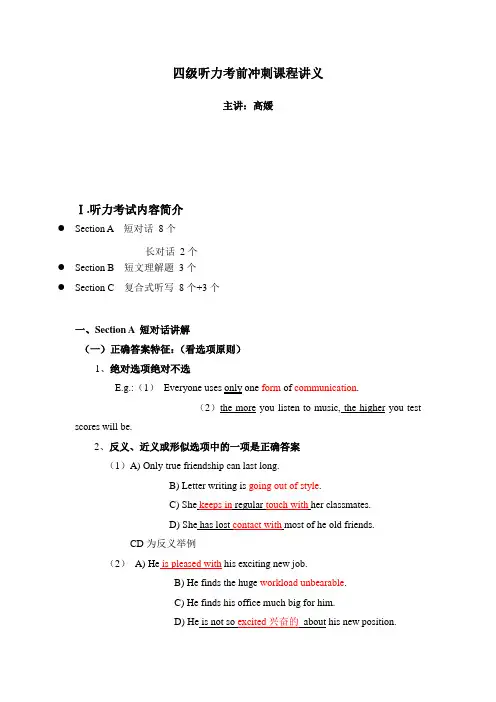
四级听力考前冲刺课程讲义主讲:高媛Ⅰ.听力考试内容简介●Section A 短对话8个长对话2个●Section B 短文理解题3个●Section C 复合式听写8个+3个一、Section A 短对话讲解(一)正确答案特征:(看选项原则)1、绝对选项绝对不选E.g.:(1)Everyone uses only one form of communication.(2)the more you listen to music, the higher you test scores will be.2、反义、近义或形似选项中的一项是正确答案(1)A) Only true friendship can last long.B) Letter writing is going out of style.C) She keeps in regular touch with her classmates.D) She has lost contact with most of he old friends.CD为反义举例(2)A) He is pleased with his exciting new job.B) He finds the huge workload unbearable.C) He finds his office much big for him.D) He is not so excited兴奋的about his new position.AD为反义选项(3)A) The man hates to lend his tools to other people.B) The man has not finished working on the bookshelf. 书架C) The tools have already been returned to the woman.D) The tools the man borrowed from the woman are missing.CD为关联选项,关于工具的两个状态(4)A) The man has never seen the woman before.B) The two speakers work for the same company.C) The two speakers work for the same floor.D) The woman is interested in market research.研究;调查BC为形似选项(5)A) It was about a little animal.B) It took her six years to write.C) It was adapted from a fairy tale神话传说.D) It was about a little girl and her pet.AD为形似选项3、四级词汇的代替选项是正确答案例如:book=reserve 预订(二)听题原则1.转折原则:正确答案出现在转折词but之后(but之后的句子一定要听懂)2.光明原则: 用在车祸或灾难题中,人受小伤(考点)小:slight/minor伤:injury/wound3.受挫原则:野餐--下雨(受挫才有考点)订房间--客满(full/fully booked)买票--卖光(sell out)交通状况--堵车(traffic jam)(三)短对话场景1、学校场景人: fresh(man)新来的人sophomore junior seniorundergraduate本科生,在校生graduate 研究生postgraduate 研究生lecturer讲师professor教授dean 系主任,院长专业: H istory C hemistry ['kemɪstrɪ] M ath e matic sA rchitecture/architect 建筑师L iteratureP hilosophyP sychology/psychologist课程分类: optional course 选修课required course 必修课day course evening course作业4: assignment任务作业paper论文考卷报纸essay论文presentation小演讲考试: middle exam mid-term examfinal exam oral test口语考试make up补考pop test突袭考,随堂考成绩3:score/grade/mark (make up原:弥补,引申:化妆)pop corn例题A) He wishes to have more courses like it.B) He finds it hard to follow the teacher.跟不上老师——听不懂C) He wishes the teacher would talk more.D) He does not like the teacher‟s accent口音.原文W: You took an optional course this semester, didn‟t you? How is it going?M: Terrible! It seems like the more the professor talks, the less I understand.Q: How did the man feel about the course?2、饭店场景rest auran t place café['kæfeɪ] eat out下馆子make a reservation预定book a table 预定位子waiter waitress menu order 点菜appetizer开胃菜'æpɪtaɪzə] main course主菜dessert甜点knife 刀fork叉子spoon汤勺chopsticks 筷子check the bill 买单change 找零(charge费用指控)treat n/v 招待,款待(it‟s my treat this time.这次我请客)例题一:A) They are both anxious焦虑的to try Italian food.对什么渴望B) They are likely to have dinner together.可能C) The man will treat the woman to dinner tonight.D) The woman refused to have dinner with the man.原文:M:Mary, would you join me for dinner tonight?W: You treated me lasted week. Now it‟s my turn. Shall we try something Italian? Q: What do we learn from the passage?例题二A) Looking for找查询a timetable.B) Buying some furniture.C) Reserving a table.预定位子D) Window shopping.只看不买的购物(隔着玻璃看的购物)原文M: Have you a table for four?W: Certainly. Sir. A corner table or would you rather 还是偏爱be near the window? Q: What is the man doing?3、工作场景apply for a job resume简历letter of application申请信简历申请信对应找工作interview interviewer interviewee offer聘用信work overtime加班complain ask for a raise 加薪fire解雇resign from a position辞职promotion升职laid off lay off下岗retirement退休钱:wage日薪salary月薪,年薪allowance津贴,生活费bonus 奖金annual income年收入假期:annual leave年假sick leave 病假paid vacation带薪假break短休例题一A) He wants to get a new position工作.B) He is asking the woman for help.C) He has left the woman a good impression印象.D) He enjoys letter writing写信.原文M: I spent so much time polishing抛光擦亮—修改my letter of application.W: It‟s worthwhile to make the effort. You know how important it is to give a good impression. 简历申请信对应找工作Q: What do we learn from the passage?例题二A) He is rather相当地disappointed失望的沮丧的.B) He is highly ambitious很大的雄心抱负.C) He can not face up to the situation.正视面对这样的情况D) He knows his own limitation.局限限制——知道自己的不足原文:W: Aren‟t you disappointed that you didn‟t get the promotion?M: Maybe a little, but I know I need more experience经验before I‟m ready for that kind of responsibility.责任——准备付起这样的责任之前Q: What do we know about the man from the conversation?4、飞机场场景book reserve destination目的地timetable时刻表flight 航班one-way ticket单程票round trip ticket 往返票first class business class economy classdirect flight non-stop flight 直航transfer exchangecheck-in检票boarding card登机牌luggage counter行李柜台security check 安检take off起飞departureair hostess空姐safety belt安全带landing着陆pick up接机(hold up支撑,耽搁end up with以..结束put up with容忍--tolerate )delay postpone晚点cancel取消例题A)The man went to a wrong check-in counter.B) The man has just missed错过his flight航班.C) The plane will leave 起飞at 9:14.D) The plane‟s departure起飞time remains依然unknown.原文:M: Is this the check-in counter for flight 914 to Los Angles?W: Yes. But I‟m sorry the flight is delayed because of a minor mechanical problem. Please wait for further notice.Q: What do we learn from the passage?5、场景补充:医疗场景:病:cold, fever, flu, headache, toothache, sore throat, stomach ache, heart attack, twisted ankle扭脚,high blood pressure, [blʌd]地点:clinic诊所, Emergency Room急诊室,Waiting Room候诊室,人:patient,client,physician , surgeon , psychologist,科室:surgeon外科,dentist牙科药:pill药丸,tablet药片, liquid液体状的药,powder粉末状的药,mixture混合剂,injection注射,operation手术make an appointment预约人(与make a reservation物区别),annual check up体检住房场景:apartment公寓,for rent往外租, to rent自己要租房,shop to let有店要出租suburb效区,downtown市中心rural效区的,urban市里的,fu r nished配备家具的,blackout断电,leak漏landlord房东,landlady二、Section A 长对话讲解(答句很重要)(一)顺序原则第一题前三四句(前7句,极限)(二)逻辑很重要(这样的句子要重点听(二三条))1.比较逻辑同等比较逻辑:as…as… the same as不同等比较逻辑:prefer A to B更喜欢A而不是B rather than B 而不是B2.转折逻辑: but however although despite 尽管dɪ'spaɪt]3.因果逻辑: because since由于既然as so due to由于thanks to多亏幸亏(三)强调处很重要 A result in B结果是B B result from A由于A1.高频词(反复听到的词):短小选项听高频词(一定要符合顺序原则)2.排比句短小选项(选项单词量三个左右,选项里的关键词是同一类词)3.强调词表唯一:only唯一的unique[ju:'ni:k[jʊ'nik]独一无二的perfect完美的最高级:most best4.数字(比如时间)5.语气词:well(well…一般表示否定) oh (一般表示惊讶,没有想到)例题一(看选项1是不是短小选项或形似选项或近义反义选项或总结四个选项共同在说什么事2根据逻辑选项之间推答案3两个选项是包含关系选大范围的)1.A) She is worried about the seminar. ['semɪnɑ研讨会B) The man keeps interrupting her.持续做某事—一直在打扰她——姐被打扰C) She finds it too hard. 从选项看出都在体现女人负面的状态D) She lacks interest in it. 第一题重点前三句要听姐是那种负面情绪2. A) The lecturers are boring.讲师B) The course is poorly designed.设计的差C) She prefers Philosophy to English.D) She enjoys Literature more.文学推出听女人,CD相似选项关键词学科3.A) Karen‟s friend.B) Karen‟s parents.短小选项听高频词,由于第三题,C) Karen‟s lecturers.要听原文中下部反复提到的词D) Karen herself.4.A) Changing her major.主修专业B) Spending less of her parent‟s money.C) Getting transferred转to the English Department.系AC相似选项,D) Leaving the university. 听提没提换专业还是换英语专业原文:M: Hey, Karen, you are not really reading it, are you?W: Pardon?M: The book, you haven‟t turned the page in the last ten minutes.W: No Jim, I su ppose I haven‟t. I need to get through it though but I keep drifting away.慢慢散去-走神了通过完成…M: So it doesn‟t hold your interesting?W: No, not really……完全没有问:有没有/没有…吗? 都是回答:yes有,no没有……不用管是不是反义疑问句W:Yeah, in a way. But the course itself isn‟t really that bad. A lot of it is pretty good in fact and lectures are fine. It‟s me, I suppose. I wanted to do Philosophy rather than English.……W: oh, they had my best interests at heart of course, my parents. They always do, don‟t they? They believe that my job prospects would have been pretty limited with a degree in Philosophy. Plus, they give me a really generous allowance. But I am beginning to feel that I‟m wasting my time and their money. They would be so disappointed失望的,沮丧的though if 如果I told them I was quitting.放弃例题二quite = game up1. A) It was about a little animal.B) It took her six years to write. 花了六年的时间去写C) It was adapted from a fairy tale. 改编自仙女传说-神话—四个选项主语书D) It was about a little girl and her pet. AD形似关键词动物女孩,听是哪个2. A) She knows how to write best-selling novels.--第一题的书是一本小说B) She can earn a lot of money by writing for adults.C) She is able to win enough support from publishers.赢得足够的支持从出版商D) She can make a living by doing what she likes.谋生3.A) The characters. 考点是姐能干什么,是一个表能力的动作,B) Her ideas. 听的目标是姐能干什么听原文中上部分‟能‟字后的句子C) The readers.D) Her life experiences.经历短小选项听中下部高频词4.A) She doesn’t really know where they originated起源来源选项两个主语B) She mainly drew on stories of ancient saints.利用古代圣人C) They popped out of her childhood dreams.产生来自于D) They grew out of her long hours of thinking.生成与来自于原文考灵感的来源M: Hi, Miss Rowling, how old were you when you started to write? And what was your first book?W: I wrote my first Finnish (finished) story when I was about six. It was about a small animal, a rabbit, I mean. And I've been writing ever since?……W: If someone asked me how to achieve happiness. Step one would be finding out what you love doing most. Step two would be finding someone to pay you to do this. I consider myself very lucky indeed to be able to support myself by writing W:……The ideas come first. So it really depends on the ideas that grasp me next. M: where did the ideas for the "Harry Potter" books come from?W: I've no ideas where the ideas came from. ……三、Section B 短文理解在文体上,短文理解分为记叙文和说明文。
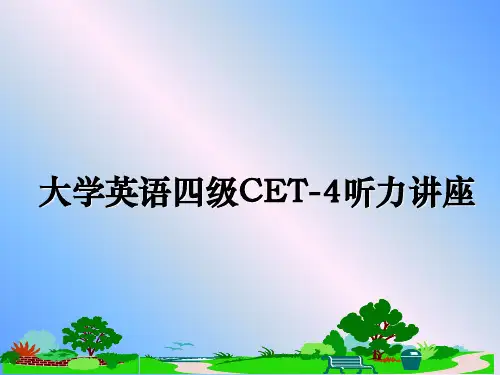

高教考试在线大学英语四级不一样的【四级课】听力讲义第一节:四级听力必备语音知识1.连音(liaison ) 规则:结尾辅音+开头元音彳列 1: M: me see. I have printed my family name, first name, date ofbirth, andaddress. Anything else?W: No. That's all right. We'll theif you'll just sign yourname at the bottom练习:an apple pick up check in / out /o-nsepl/ find out fill in / out take offturn around look in / outnot at all /nD-tse-t ,/ think about it tired of it cut it out rest of it check it outget it overget over it例 2 : W: It's really cold in this apartment. Can we __ ___ the heat a little bit?M: Sorry, I've ________ you'd better put on a sweater._ money and can hardly pay the fuel bill. Maybe 例 3 : M : I think youought tosee a doctor _ about that cough.W: Well, Til wait a few more days, I'm sure I'll soon.彳列 4 : If we ask Americans why they eat with knives and forks, or why their men wear pants skirts, or why they may be married to only one person at a time. 例5 :1. : a fight scene has to look real. Punches must enemy's jaws.2. : If a movie scene is dangerous, stunt people usually the stars.: Canutt alsoa new way to make a punch look real. He was the only练习: strike extend station space straight Australia experience studio discover expensive skiskatespringspiritdiscusshowever, which we have abused to a considerable degree in these pastexploitation.This exploitation has reached suchthat presently it appears that some hundreds of thousands of will bebefore the end of the century, in our times, human shrewdness has masteredthe deep of the earth. 整体练习:2018-6-1-A1 :❖ A message in a bottle sent out to sea by a New Hampshire man more than fivedecades ago was found 1,500 miles away and has been returned to his daughter. ❖ She held up to her father's promise, giving Buffington that reward.2018-6-1-B1 :♦ M: Do you feel like going out tonight?♦ W: Yeah, why not? We haven ,t been out for ages. What's on?❖ M: Well, there's a film about climate change. Does is sound good to you?❖ W: Oh, not really. It doesn't really appeal to me. What's it about? Just climate change? ❖ M : I think it's about how climate change affects everyday life. I wonder how theymake it entertaining.2018-6-2-A1 :❖ She said the snake first slid back under the seat, and she hoped it would stay thereuntil she was able to get off the highway and stop, "that didn't work out,” she said, "here he comes, and he wound up in my back seat before I could finally get off the road, stop and get ou t of the car” she called for help. And Washington County例10: The planet, two centuries ofanimal control officers came and captured the snake.第二节.读选项技巧+新闻主旨题1. 四级听力如何读选项: 扫主干: 求同: 存异:要求考生能听懂语速较慢的短篇英语广播。
大学英语四级听力选材听力材料的选材原则一般基于以下三点:•一. 对话部分为校园生活中的一般对话,句子结构和内容不太复杂.•二. 短文部分的材料是题材熟、情节不太复杂的故事、讲话或叙述等.•三. 所用词汇一般不超过教学大纲词汇表规定的范围.四级听力内容与分值•听力内容(35%):1. 短对话(Short conversation) (8%)2. 长对话(Long conversation) (7%)3. 短文(Passages) (10%)4. 复合式听写(Compound dictation) (10%)一.短对话部分:该部分一般是日常生活中的对话,即衣、食、住、行、工作、学习、生活等话题,场景可分为校园、公共场所、家庭、办公室等方面。
每题1分。
•问对话发生的地点和场所•提问人物关系或身份•计算类•人物的计划或打算•人物的感觉状态•交通或交通工具•请求或建议•释义、替换或上下文•人物的态度观点或考生从对话中获得的信息或结论短对话题型:1.弦外之音—―言外之意‖题型2.妙语连珠—观点态度题型3.虚虚实实—虚拟语气题型4.咬文嚼字—理解归纳题型5.多姿多彩—生活场景题型6.怪声怪气—语气态度题型1.弦外之音—“言外之意”题型这类题型难度较高,对话中的回答人并不从正面回答问题,似乎答非所问。
这就需要我们运用解题的逻辑思维与推理过程,也就是通常所说的―顺藤摸瓜‖方法来答题。
此类题型中,一些句子的真实含义不是直截了当地摆在我们面前,而是我们根据对话中揭示的内容去寻找与其相关的其他事物以及它们之间的联系。
可分为两类:陈述回答型和疑问回答型。
1)陈述回答型例:M: I need to find a dentist; you said you know Dr. Smith well, do you recommend her?W: Well, I had to see her a few times, but what impressed me most was the magazines in her waiting room.Q: What does the woman imply?A) Dr. Smith’s waiting room isn’t tidy.B) Dr. Smith enjoys reading magazines.C) Dr. Smith has left a good impression on her.D) Dr. Smith may not be a good choice.言外之意:女的丝毫不提史密斯的医术如何,只说了一些无关紧要的琐事,无非是暗示她的医术很烂,故不愿意向男的推荐。
M:How does Nancy like the new dress she bought in Rome?W:She said she would never have bought an Italian style dress if she had known Mary had already got such a dress.Q:What do we learn from the conversation?[A] Many has a keen eye for style.[B] Nancy regrets buying the dress.[C] Nancy and Mary went shopping together in Rome.[D] Nancy and Mary like to follow the latest fashion.2)疑问回答型请掌握以下几种表达建议和表示反对的语句表示建议:Why not...?Why don’t you...?Wouldn’t...?How about...?表示反对:Should...he/she/we/they...be doing...?表示责怪:Shouldn’t...?例:W: I hear that the Edwards are thinking of buying another house.M: Should they be doing that with all the other expenses they have to pay? Anyhow, they are over 70 now, their present house is not too bad.Q: What does the man imply?A) The Edwards are quite well-off.B) The Edwards should cut down on their living expenses.C) It’ll be unwise for the Edwards to buy another house.D) It’s too expensive for the Edwards to live in their present house.言外之意:用划线问句这个结构表示说话人的反对情绪。
M:Y ou are not going to do all those dishes before we leave, are you? If we don’t pick up George and Martha in 25 minutes we will never get to the theater on time.W:Oh, didn’t I tell you, Martha called to say her daughter was ill and they could not go tonight.Q:What is the woman probably going to do first?[A] Wash the dishes. [B] Go to the theatre.[C] Pick up George and Martha. [D] Take her daughter to hospital.2.妙语连珠—观点态度题型例:W: I am worried about Jenny going to college. College students are so wild nowadays.M: Actually, only a few are like that. Most students are too busy studying to have time to cause trouble.Q: What does the man imply?A) He doesn’t want Jenny to g et into trouble.B) He doesn’t agree with the woman’s remark.C) He thinks Jenny’s workload too heavy at college.D) He believes most college students are running wild.分析:从男性说话中的actually一词可以听出他并不同意女性刚刚说的内容,他有自己的想法,类似的词语还有in fact,这也提醒我们,抓住短对话中的小词去揣摩说话人的态度也是非常关键的。
M: I just received an Email from one of my former classmates. I was surprised, I hadn’t heard from him for ages.W: Well, I’ve been out of touch with most of my old friends, only one or two still drop me a line occasionally,Q: What does the woman mean?A) Only true friendship can last long.B) Letter writing is going out of style.C) She keeps in regular touch with her classmates.D) She has lost contact with most of her old friends.3.虚虚实实—虚拟语气题型这属于一种隐性考法,用虚拟语气表达一种抱怨、后悔等情绪,主要体现虚拟语气的关键词有:if, if only, I only wish..., couldn’t have done something...without...等。
例:M: I wonder if you find my experience relevant to the job.W: Yes, certainly, but if only you had sent in your application letter a week earlier.Q: What does the woman imply?A) The man is not suitable for the position.B) The job has been given to someone else.C) She had received only one application letter.D) The application arrived a week earlier than expected.M: How about joining me for a cup of coffee?W: I’d love to, but I’m exhausted. I was up till 3 this morning, writing a paper for my literature class.Q: Why does the woman decline the man’s invitation?A) She wants to get some sleepC) She has a literature class to attendB) She needs time to write a paperD) She is troubled by her sleep problem4.咬文嚼字—理解归纳题型这类题型难度颇高,关键在于后者说话当中的生词及细节较多,考生很难在短时间内完全把握对话的实质内容,能否答对就要看自己平时的积累。
例:M: Excuse me, Madam? Is the air-conditioning on? This room is getting as hot as a furnace.W: Sorry, sir, a new epidemic (流行病) called SARS is threatening us right now. As a preventative measure (预防措施), we are told to let in fresh air by opening the windows and not to use air-conditioners.Q: What does the woman mean?A) The temperature is not as high as the man claims.B) The room will get cool if the man opens the windows.C) She is following instructions not to use the air-conditioning.D) She is afraid the new epidemic SARS will soon spread all over town.W: Y ou had a job interview yesterday, didn’t you? How did it go?M: Not too bad, I guess. There were about 20 candidates competing for the sales manager’s job. And finally it was down to three of us, but the other two seemed better qualified.Q: What does the man imply?A) He is confident he will get the job.B) His chance of getting the job is slim.C) It isn't easy to find a qualified sales manager.D) The interview didn't go as well as he expected.5.多姿多彩—生活场景题型总体而言,常见的短对话场景大致可分为如下三种:1.学生学习生活场景2.健康生活场景3.交通活动场景学生学习生活场景1)选修课难,要少选,但却有意思;2)学生功课很忙,经常遇到阻碍,男生一般很紧张,女生却比较从容;3)学生很喜欢―临时抱佛脚‖(尤其男生),女生往往站在教育者的角度教育男生;4)经常询问同学论文的进展速度,也很关心别人对自己的论文怎么评价;5)当谈到教授演讲或报告时,主要特点是内容难,跟不上,而且内容枯燥,速度快;6)同学互助一般为:帮助照看东西、帮忙通知信息、帮忙补课等7)学生兼职一般做:助教、服务生、社会调查等;8)宿舍里,同学听音乐、玩游戏,影响了自己正常学习,然后提出自己看法。